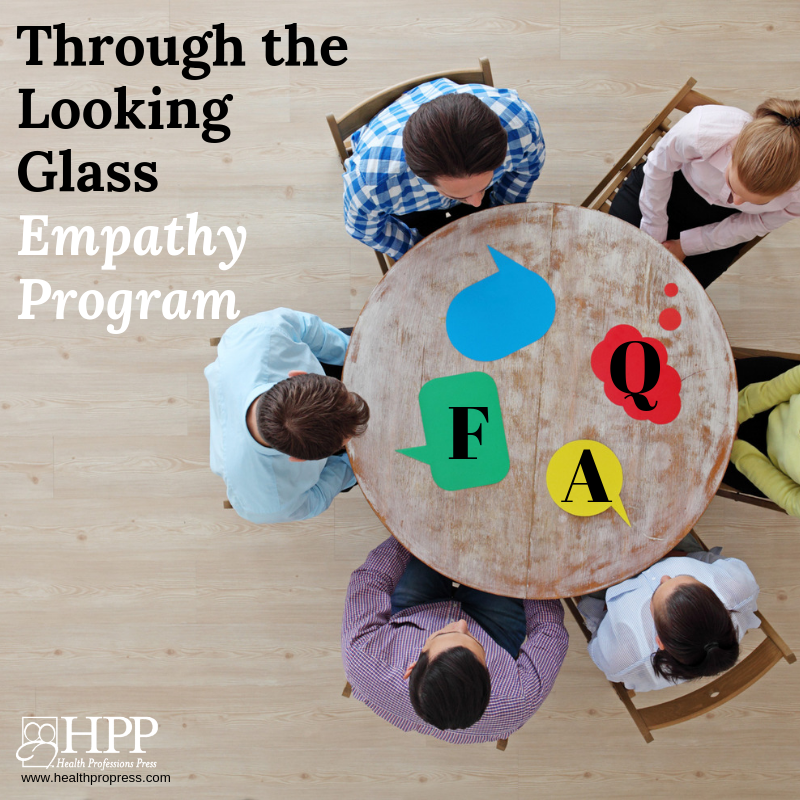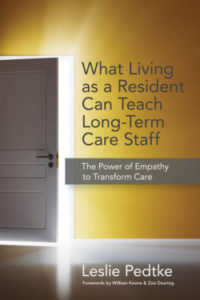
Through the Looking Glass is an empathy program created by an administrator struggling to jump-start culture change in her residential care community. This unique program challenges staff to put themselves in the shoes of the residents, by having staff simulate a diagnosis and live alongside residents. Creator of the program and author of What Living as a Resident Can Teach Long-Term Care Staff, Leslie Pedtke, answers frequently asked questions on how to set up this program in your community.
Did you have to get approval from the Department of Public Health to do the program?
We did not get any kind of formal approval to do this program. I contacted our attorney and the Illinois Department of Public Health and let them know what we were going to do. They could not think of any reason why we should not do the program.
Do the participants sign waivers?
We did not have the participants sign a waiver. The participants were made aware of the rules of the program and agreed to them.
Have you ever been worried one of the participants would develop a pressure sore?
No participant has ever developed a pressure sore or been hurt during their stay with us. Remember, these are generally very healthy people who are moving in with us.
How does the staff feel about taking care of someone who is not really a resident?
This was one of the hardest challenges the first time we did Through the Looking Glass. Everyone is busy, and it was frustrating to the staff at first to have to take time to care for someone who did not really need care. This gradually became less of an issue as the years of doing the program progressed. They want to provide a learning experience for the participant as well as for themselves as care partners. And the staff, of course, are going to choose to take care of a real resident before a pretend one.
Did you find it was easier to manage the staff’s experiences of the program if you had one participant at a time move in versus several staff members moving in together?
Yes, I did find it easier. When I had five participants all living there at the same time it was really busy because it was doing five challenges at a time, interviewing and filming, and so forth. Having only two people participate at a time would be a lot more manageable and having just one person would be even easier. The less people who move in at one time is also easier on the staff caring for them.
Do the participants get paid for being in the program?
Yes and no. They get paid for the time they would have normally been working. All of their other time is their donation to learning what it is like to live as a resident in long-term care.
Do you do Through the Looking Glass only for nursing staff?
No, all types of staff have chosen to participate in the program: RNs, LPNs, and CNAs; DONs; housekeeping and laundry staff; OTs and PTs; activity and social services staff; and dietary staff. Anyone employed by your organization can benefit.
Has anyone ever resigned while participating in Through the Looking Glass?
No one has ever resigned from their position in the community while participating in the program.
How have the elders felt about being a roommate for a participant in the program?
We always ask permission from an elder before he or she is paired with a participant. The elders have for the most part enjoyed and been fully supportive of what their care partners are learning. They like the company, and they like telling them about life in long-term care and what their life was like before they moved into the nursing home.
How did the program change you all?
It changed the way we look at our care practices and approach issues. It opened our hearts and minds to change. We often now think first about what is most comfortable for a resident rather than a task that needs to be done.
Has anyone ever moved into the nursing home secretly posing as a resident to assess the community’s approach to care?
No, however, many people have asked us this question. I have even had ombudsmen from different areas say that they should secretly move into nursing homes in their own regions. We have never considered doing any part of the program “undercover.” Relationships are built on trust, and relationships and trust are really, really important to us. Communication and teamwork are also important, and we think we can tackle challenges with all of those building blocks (relationships, trust, communication, teamwork).
What life lessons have you as an administrator learned through this program?
I have learned a lot about trust and communication. All of our jobs are hard in long-term care. There is not one job that is not emotionally stressful at times. Every piece has meaning and every piece is needed. I say this because it is so easy to get caught up in the hustle and bustle of the day. We all know that some days can be chaotic and there is a desire to want to close our eyes to the needs that are causing the chaos. I have learned to be a better listener. Listening takes a lot of practice. As an administrator, we want to fix things; but sometimes listening is fixing. So, I think the three life lessons I have learned from this program are trust, communicate, and listen.
If I am an administrator and want to pitch Through the Looking Glass to my corporate office, summarize what you would tell them to persuade them to agree to it. Include what I could change to make up the money I would spend doing the program.
This is the hardest question to answer. It comes up at every presentation I do. “I would love to do this, but how much does it cost?” or “My corporate people won’t let us do this.” My suggestion would be to
- Take a look at the amount of money you are spending on staff re-education. Not only the cost of staff re-education, but also the time staff are clocked in to be re-educated.
- Look deeply into the in-service plan you already have and ask yourself what is working and, more important, what is not working. Determine how much money you are spending in the not-working-so-great-for-us column. How does it compare?
- Take a look at the money you are spending on recruiting and orienting new staff.
- Take a deep look at staff retention.
Do these things and then ask yourself, based on our own experience, whether implementing Through the Looking Glass, or even an Elder Shadowing Program, might actually save you money.
If the corporate decision makers do not approve the program, what would you suggest I do instead to incorporate more change in my facility?
Again, look at what you need to change. Then look at why it is a problem. Do a root cause analysis, or, as I like to say, treat the problem, not the symptom. Involve everyone in the discussion and get everyone excited about the possibility of deep change. Change is scary and fun and exciting and terrifying all at once. Acknowledge that. It is okay to let everyone know you are scared, too. The end result will be worth it.
For more information on the Through the Looking Glass Program, and how to implement this empathy program in your community, visit www.healthpropress.com/pedtke.
Leslie Pedtke, L.N.H.A., created Through the Looking Glass while working as Administrator for Aviston Countryside Manor. She is now Educator for Quality Improvement for King Management Company. Through her experience of more than 20 years, she has built a foundation of person-directed care at Aviston as well as at King Management’s other long-term care and assisted living communities.
Read the book!
What Living as a Resident Can Teach Long-Term Care Staff
The Power of Empathy to Transform Care
By Leslie Pedtke, L.N.H.A.
Copyright © 2017 by Health Professions Press, Inc.


